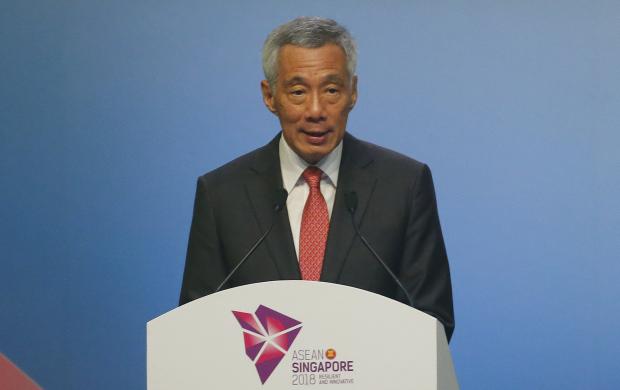Singapore PM warns Asean about threats to economic growth

Prime Minister Lee Hsien Loong of Singapore addresses delegates during the opening ceremony for the 33rd ASEAN Summit and Related Summits Tuesday, Nov. 13, 2018, in Singapore. The summit is expected to discuss the South China Sea issue, maritime security and terrorism. (Photo by BULLIT MARQUEZ / AP)
SINGAPORE — Singapore Prime Minister Lee Hsien Loong warned Southeast Asian leaders about threats against international rules that underpin world stability and economic growth.
“The international order is at a turning point,” Lee said at the opening ceremony here of the summit of the 10-nation Association of Southeast Asian Nations (Asean).
“The existing free, open and rules-based multilateral system, which has underpinned Asean’s growth and stability, has come under stress,” Lee said.
U.S. President Donald Trump’s “America First” foreign policy and his resistance to multilateral agreements and institutions are viewed as an affront and a challenge in a region whose modern economies are largely driven by global trade.
READ: Asean Summit focuses on US-China trade tensions
Among issues on the agenda for Asean and other leaders attending meetings in Singapore this week, including U.S. Vice President Mike Pence, are talks on a new regional trade pact that would commit member countries and others in the Asian-Pacific region to opening markets further.
Lee said Asean and other participating countries including India and China, but not the United States, have made “substantive progress” on the market-opening initiative, called the Regional Comprehensive Economic Partnership.
However, it’s unclear if a deal will be reached in Singapore. Participants say India, for one, is balking at opening its markets wider to imports from China under the accord.
Trump is staying away from the Singapore summit, and also from the annual meetings of the Asia-Pacific Economic Cooperation forum that will begin later this week in Port Moresby, Papua New Guinea.
Chinese leaders are busy burnishing their own free trade credentials as they speak out against Trump’s efforts to get Beijing to change policies aimed at making Chinese industries leaders in advanced technologies.
READ: China’s premier reassures Asean on growth, peace
Three days after taking office, Trump pulled out of a Pacific Rim trade initiative, the Trans-Pacific Partnership. He has ordered punitive tariffs on billions of dollars of Chinese products, among other measures, to address complaints over the U.S. trade deficit, China’s technology policies and other market access issues.
“All countries are linked in the same industrial chain in the world today and China and the U.S. are an important part of it. No one wants or expects to see an interruption of it,” Chinese Premier Li Keqiang said Tuesday in a lecture on the sidelines of the summit.
Asean groups Brunei, Cambodia, Indonesia, Laos, Malaysia, Myanmar, the Philippines, Singapore, Thailand and Vietnam.
The globalization of manufacturing has been a key factor driving dynamic growth in the regional economy, which has more than doubled in size since 2007 to $2.8 trillion in 2017.
The momentum must be in the direction of more, not less, open trade, said Malaysian Prime Minister Mahathir Mohamad.
Otherwise, he warned, there could be a “domino effect” in which countries engage in increasingly protective measures against their rivals.
Inward-looking, protectionist policies have gained ground in ASEAN as elsewhere, he said.
“This is not the time to close our doors by invoking trade protectionism measures but instead we should be actively engaged in finding amicable solutions,” Mahathir said. “It is now that we must continue to expand our intraregional trade and deepen the economic integration within ASEAN.”
While talks on the Asean-centered trade accord stumble along, the 11 countries that have remained in the Trans-Pacific Partnership are preparing to inaugurate their revised trade deal.
Renamed the Comprehensive and Progressive Trans-Pacific Partnership, it is due to take effect on Dec. 30.
Several other economies are hoping to join the pan-Pacific accord, including the Philippines and South Korea.
Japanese media reported that Taiwan’s representative in the Asia-Pacific Economic Cooperation forum, former chairman of Taiwan Semiconductor Manufacturing Co. Morris Chang, plans to ask Japan to back the island’s request to also become a member. /atm














